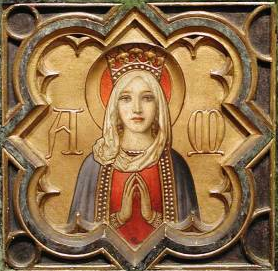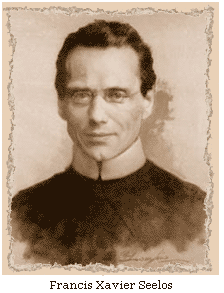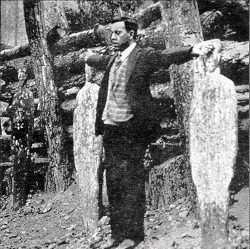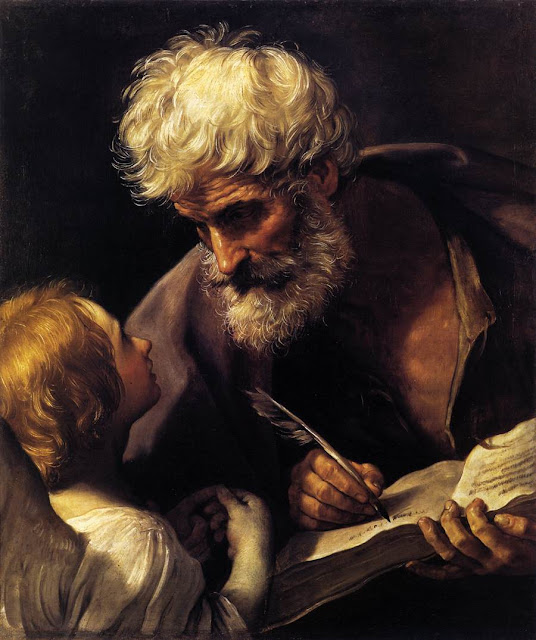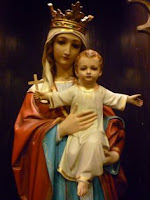"Holy Communion"
To Jerusalem
+
 |
| R. Somerset Ward and Bede Griffiths, Guildford Cathedral, England |
Of the Blessed Sacrament of the Body and Blood of Christ we may well say with the Patriarch Jacob, “This is none other than the Gate of heaven,” for assuredly at the consecration a door is opened into Heaven and through it comes the Lord of Love bearing His Life to men.
Nevertheless this sight is not for all eyes to see, and it is with Christians at the Eucharist as it was with the blind man healed by our Lord ; at first they see nothing but hear a voice ; then they see but dimly “men as trees walking” ‘ and lastly they see the Glory that is there. Let us, therefore, set down in poor words that which happens in the Blessed Sacrament, and then the way to know it.
It is hard for us who live in this world, manifest to our senses, to know that it is a prison ; that we are bound by earthly bodies in a circular prison while all round the outside of our prison is freedom and the other and true world : the world of eternal life. Nevertheless so it is, nor are there any ways by which we may escape from prison into the true life save three : prayer, the Blessed Sacrament, and death. in all these ways a soul may leave the body and pass through a door opened in the shell of the prison into the world of eternal life. In the first two ways the soul must return from its excursion, but in the third it remains. We may not compare these ways, for in order to make comparison we need to know the whole extent of each and no human being may do this. Nevertheless we may say that each in its order is more universal than the one before it.
So in the Blessed Sacrament there is opened, before each Christian, a door. Through this door our Lord Himself enters this world. I beseech you to consider this a moment. We know that our Lord is in all things our perfect example. Here daily He sets before us an example of perfect humility. In all the glory of His Ascended Majesty, the Judge of all the world comes to us, not as in Bethlehem for all the race, but for a few poor dazed and blind souls gathered together to meet Him. While they wait there, battling with distracting thoughts, cold and with little love, He lowers Himself in exquisite pity to come to their prison for love of them. Truly He does, Himself, that which He requires of us in the Day of Judgement, for we are sick and He visits us, we are in prison and He comes unto us.
Nor is this all, for He Himself brings with Him the food of life. All life is in Him, and from this overflowing store He feeds the sick prisoners, giving them life and strength for their bodies in His Body and for their souls in His blood. It is this Eternal Life, from the world of eternal life, which keeps alive the soul of the world ; which glows and vibrates in each soul, lighting something in other souls, and feeding the spiritual life of the world. Daily is the prison of the world of our senses broken into by the victorious Lord, daily are the souls therein filled with the life which will enable them to break out of it into their true home, the world of eternal life.
It would, however, be a narrow view of this great means of grace which limited its purpose to this world of ours. For the life which proceeds from the other world is like a wave which, passing through the door, floods those who receive it, and then like a wave recedes, drawing them with it through the gate.
Many are they who know these things to be true yet long to experience them.. It were well that they should remember in the first place that in general the approach to any spiritual experience is by a long and slow growth ; that, above all, long training and practice are needed. This seems to be especially true of the Blessed Sacrament : for it is usually only by slowly learning devotion and concentration, by a long desire, and by the constant frequenting of this Holy Communion that the soul comes to the experience. First comes the conviction, the certainty, that there is a Presence in the Blessed Sacrament. Then perchance the soul is aware on certain occasions of a direct message at the time of Communion and this may happen frequently. Then very dimly the Presence becomes more real, bringing a new sense of awe. While, finally, for those happy few whom God brings to this state, comes the frequent entry into the world of eternal life, the overpowering sense of the entering Lord, and the moment of blissful Communion.
There is no royal way for those who seek the full revelation of this Sacrament. It is only by patient discipline and long practice that clear sight comes. I held as more important than they are, but I append a few maxims which may assist the soul.
I. It is Desire which is they key to the door of experience.
2. True desire manifests itself in patience and perseverance.
3. Perseverance is chiefly shown in maintaining constant standard in preparation for Holy Communion, and thanksgiving after it.
4. Distracting thoughts are not sins unless they are consciously persisted in.
5. It is as well to have certain places in the service at which the attention is always specially concentrated (e.g., Prayer for Church militant. Sanctus. Prayer of oblation) ; this serves as a safeguard against vagueness.
6. The true experience may be known by the joy and vitality it brings.
7. There is no way to prolong experience beyond the time our Lord wills, but we can remove all hindrances to its prolongation on our part by complete and constant surrender.
It is painful to write words on this subject knowing their poverty and how little they touch even the fringe of that which is in this Sacrament. Nevertheless I pray that all who read them may be aware of the open door, and of the Lord Who enters, of the life He brings, and, if it be His will, of the world from which He comes.
+Panis Angelicus

